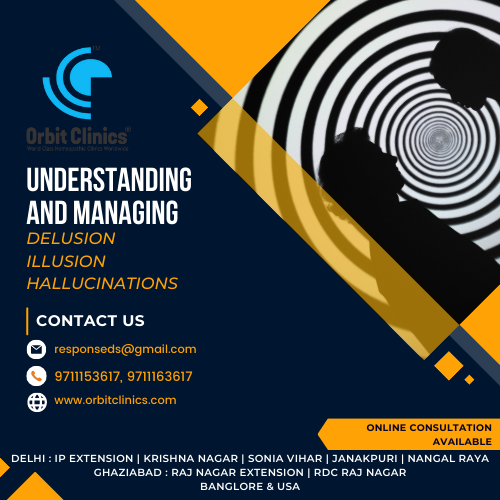A Comparative Study and Homeopathic Approach

Written by
Dr. Deepak Sharma
BHMS, MD, Ph.D. (Scholar)
Homeopathic Physician and Educator
Founder – Orbit Clinics (World Class Homeopathic Clinics Worldwide)
Firstly, let’s delve into the intricate definitions:
- Delusion: This is a potent conviction or sentiment tenaciously upheld, notwithstanding the presence of overwhelming evidence or generally accepted reality, contradicting it. Primarily seen within the realms of neurological or mental health disorders, delusions are often exhibited in scenarios such as delusions of grandeur where individuals erroneously believe themselves to be endowed with extraordinary powers or capabilities. As an integral manifestation of mental disorders such as schizophrenia, delusional disorder, or mood disorders, delusions provide a distinct insight into these conditions.
- Illusion: Essentially, an illusion is a sensory distortion, offering a glimpse into the typical workings of the human brain in organizing and decoding sensory stimulation. Although they may involve any of the senses, visual illusions are the most recognized and comprehended. Despite the distortion of reality, illusions are birthed from a sound mind’s interpretation of external stimuli. A classic example of an illusion is the perceived presence of an oasis within a desert landscape when one is in fact observing a mirage.
- Hallucination: These are perceptions experienced in a conscious and alert state, devoid of any external stimuli, yet boasting qualities akin to real perception. Hallucinations can be vivid, intense, and situated in external objective space, presenting in any sensory modality – visual, auditory, olfactory, gustatory, tactile, etc. A typical scenario might involve an individual hearing non-existent voices or perceiving things that do not exist. Similar to delusions, hallucinations are symptomatic of mental health disorders such as schizophrenia, though they may also result from certain drugs or extreme physical conditions like high fever.
Here’s a summarized table to illustrate the differences:
| Delusion | Illusion | Hallucination | |
| Definition | A false belief maintained despite evidence to the contrary. | A distorted perception of reality. | A perception in the absence of any external stimulus. |
| Involves | Belief | Perception | Perception |
| Occurrence | Mental health disorders (e.g. schizophrenia, delusional disorder, mood disorders). | Normal sensory interpretation, can be experienced by anyone. | Mental health disorders (e.g. schizophrenia), substance-induced, extreme physical conditions. |
| Example | Believing one has superhuman powers. | Seeing a mirage in the desert. | Hearing voices that aren’t there. |
| Impact on Reality | Changes belief about reality. | Misinterprets actual stimuli from reality. | Creates a perception without any reality basis. |
The Role of Homeopathy:
Homeopathy represents an alternative medicinal system, premised on the “similia similibus curantur” principle, or “like cures like.” This implies that a substance inducing symptoms in a healthy person can serve as a treatment for similar symptoms in an afflicted individual, but in extremely diluted doses. Central to this belief is the self-healing capacity of the human body, and homeopathic remedies aim to galvanize this process.
Homeopathy’s uniqueness lies in its personalized treatment approach. Each person is regarded as a distinct entity, and the choice of medication is based on the aggregate of symptoms rather than the disease itself. It adopts a holistic stance, striving to treat the individual on all levels – body, mind, and spirit. Furthermore, homeopathic remedies are typically safe, resulting in no or minimal side effects, provided they are appropriately used under professional supervision.
Homeopathic Interventions for Delusion, Illusion, and Hallucination:
- Delusion: Within the homeopathic context, delusions are viewed as an imbalance in the individual’s mental state. Remedies such as Anacardium orientale might be recommended for patients suffering from delusions, particularly those exhibiting grandiose or persecutory delusions.
- Illusion: As it pertains to illusions, regarded as benign distortions of perception, remedies like Phosphorus might be administered. This remedy is often utilized in cases where sensory overstimulation leads to distorted perceptions.
- Hallucination: In the event of hallucinations, where external stimuli are absent, Stramonium is commonly suggested. This remedy is particularly beneficial when hallucinations incite fear or anxiety within the individual.
DO NOT TRY ANY MEDICINE WITHOUT PROPER CONSULTATION OF A HOMEOPATH
THIS IS FOR STUDY PURPOSE ONLY


